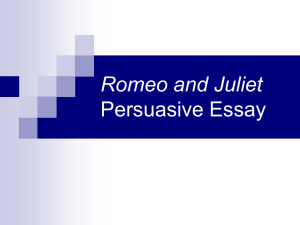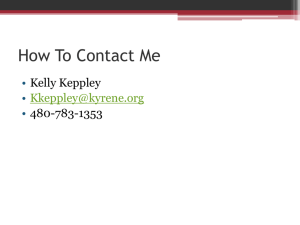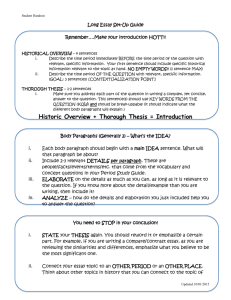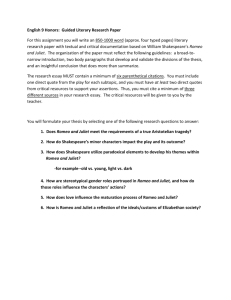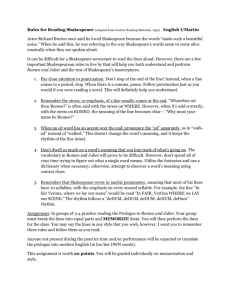Romeo-and-Juliet.doc
advertisement
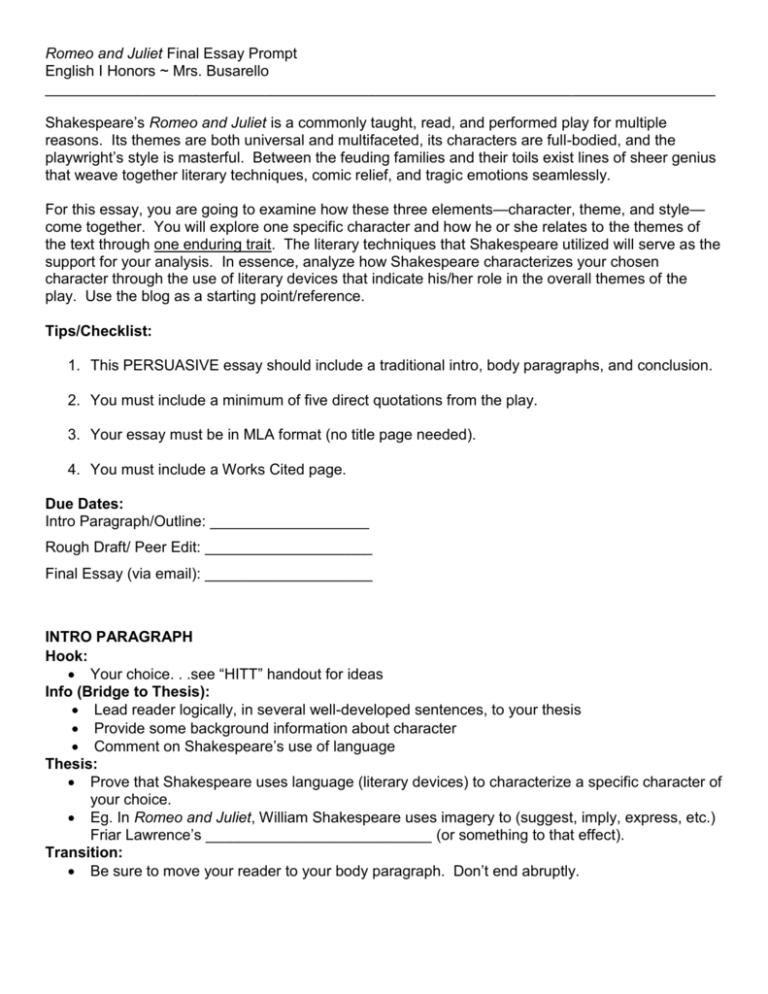
Romeo and Juliet Final Essay Prompt English I Honors ~ Mrs. Busarello ________________________________________________________________________________ Shakespeare’s Romeo and Juliet is a commonly taught, read, and performed play for multiple reasons. Its themes are both universal and multifaceted, its characters are full-bodied, and the playwright’s style is masterful. Between the feuding families and their toils exist lines of sheer genius that weave together literary techniques, comic relief, and tragic emotions seamlessly. For this essay, you are going to examine how these three elements—character, theme, and style— come together. You will explore one specific character and how he or she relates to the themes of the text through one enduring trait. The literary techniques that Shakespeare utilized will serve as the support for your analysis. In essence, analyze how Shakespeare characterizes your chosen character through the use of literary devices that indicate his/her role in the overall themes of the play. Use the blog as a starting point/reference. Tips/Checklist: 1. This PERSUASIVE essay should include a traditional intro, body paragraphs, and conclusion. 2. You must include a minimum of five direct quotations from the play. 3. Your essay must be in MLA format (no title page needed). 4. You must include a Works Cited page. Due Dates: Intro Paragraph/Outline: ___________________ Rough Draft/ Peer Edit: ____________________ Final Essay (via email): ____________________ INTRO PARAGRAPH Hook: Your choice. . .see “HITT” handout for ideas Info (Bridge to Thesis): Lead reader logically, in several well-developed sentences, to your thesis Provide some background information about character Comment on Shakespeare’s use of language Thesis: Prove that Shakespeare uses language (literary devices) to characterize a specific character of your choice. Eg. In Romeo and Juliet, William Shakespeare uses imagery to (suggest, imply, express, etc.) Friar Lawrence’s ___________________________ (or something to that effect). Transition: Be sure to move your reader to your body paragraph. Don’t end abruptly. BODY PARAGRAPHS (3 or 4) Each should begin with some kind of logical transitioning sentence, not a “plop” generalized transition like “Next” “Second of all” or “Lastly”; The reader should FEEL the transition, not be hit in the face with it Organize body paragraphs chronologically, by lit. device, in order of least obvious to most striking, by what character says to what others say (perspectives), etc. Use whatever order works for your examples or character, but be PURPOSEFUL! Embed your quoted phrases naturally, and be sure to cite each appropriately Analyze not plot summarize; you are proving that language (i.e. imagery) is the method of characterization not that Romeo did impulsive acts. CONCLUSION Sum up, but do not repeat prior wording of, your main points Provide synthesizing insights Suggest what theme(s) the author suggests by the characterization OTHER HELPFUL HINTS Review your individual writing goals and past corrections. Review your notes for our class writing lessons—especially thesis statements, sentencing, and diction/word choice. Try to vary your sentence structures and wording so that writing flows and is not choppy, trite, or blasé. Come for help when you need it. If you have a question, email me at pbusarello@lrhsd.org.

